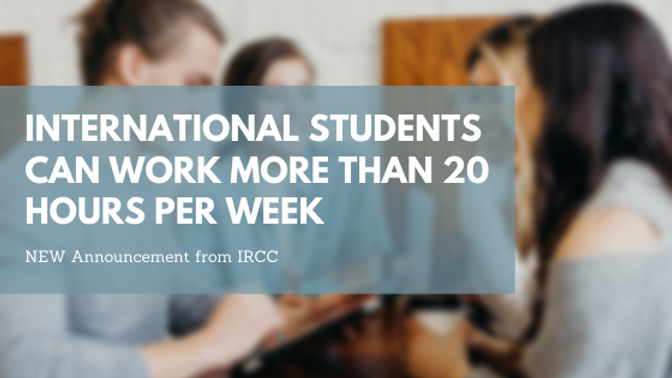Work hours for International students.
IRCC Update: Canadian government extended a rule allowing International students to work more than 20 hours per week.
Thanks to its top-notch educational institutions, friendly and diverse society, and opportunities for some students to work or immigrate permanently after graduation, Canada is a top choice for international students. While international students have made significant contributions to Canadian campus life and innovation, they have also faced significant obstacles while pursuing their education, such as difficulty finding suitable housing.
The Right Honourable In order to ensure that international students are financially prepared for life in Canada, the Ministry of Immigration, Refugees, and Citizenship, Marc Miller, announced today that the cost-of-living financial requirement for study permit applicants will be raised as of January 1, 2024. From now on, this cutoff will be modified annually in accordance with Statistics Canada’s updates to the low-income cutoff (LICO). LICO represents the minimum income necessary to ensure that an individual does not have to spend a greater than average portion of income on necessities.
Since it was first established at $10,000 for a single applicant in the early 2000s, the cost-of-living requirement for study permit applicants has remained unchanged. Because of this, the financial requirements haven’t kept up with the rising cost of living over time, which means that when students arrive in Canada, they find their funds are insufficient. In 2024, a single applicant will have to demonstrate that they have $20,635, which is equivalent to 75% of LICO, plus the cost of their first year’s tuition and transportation. New applications for study permits submitted on or after January 1, 2024, will be subject to this modification.
Although we believe that this will lessen student vulnerability and exploitation, we acknowledge that each applicant’s experience with the change may differ. We plan to launch focused pilots with partners in the upcoming year to test out fresh concepts aimed at supporting underrepresented groups of international students pursuing their education in Canada.
The announcement made today comes after significant changes to the International Student Programme were made public on October 27, 2023. These changes deal with the creation of a new framework for identifying educational institutions that offer international students housing and other first-rate services and support. We anticipate that educational establishments will only take as many students as they can accommodate, including housing options.
It is our duty to ensure that foreign students are supported during their stay in our nation when we welcome them. We are ready to take the required steps, such as restricting visas, in advance of the September 2024 semester to make sure that approved educational institutions offer sufficient and appropriate student supports as part of the academic programme. Working together with learning institutions, provincial and territorial governments, and other education stakeholders is essential to achieving this goal and making sure that international students are prepared for success in Canada.
Additionally, Minister Miller gave an update on three temporary regulations pertaining to international students that were scheduled to end at the end of 2023:
The exemption from the 20-hour weekly cap on the amount of time foreign students can work off-campus during the academic year will last until April 30, 2024. Up until December 7, 2023, international students who are already in Canada and those who have already applied for a study permit will be permitted to work off campus for more than 20 hours per week. Future options for this policy are still being considered; one such option is to allow international students to work off-campus up to 30 hours a week during the academic year.
For students who start a study programme before September 1, 2024, the accommodating measure that has allowed international students to credit time spent studying online towards the duration of a future post-graduation work permit will remain in effect, provided that the time spent studying online makes up less than 50% of the programme of study. On or after that date, students who start a study programme won’t be subject to this measure. Measures to facilitate distance learning were first put in place in 2020 in response to travel restrictions brought on by the pandemic; they were scaled back in September of 2022. Currently, the great majority of international students are enrolled in Canadian universities in person.
Three times during the pandemic and the post-pandemic recovery, a temporary policy was implemented to give post-graduation work permit holders an additional 18 months of work permit, as their original work permit was about to expire, in response to labour market disruptions. Foreign nationals may still apply if they have a post-graduation work permit that expires on December 31, 2023. This temporary measure, though, won’t be renewed.


I loved even more than you will get done right here. The picture is nice, and your writing is stylish, but you seem to be rushing through it, and I think you should give it again soon. I’ll probably do that again and again if you protect this hike.
The amount of effort that you put into it was very impressive to observe. However, despite the fact that the layout is appealing and the wording is elegant, it appears that you are having difficulty with it. It is my opinion that you should make an effort to send the subsequent article. In the event that you do not safeguard this hike, I will most certainly return for more of the same.